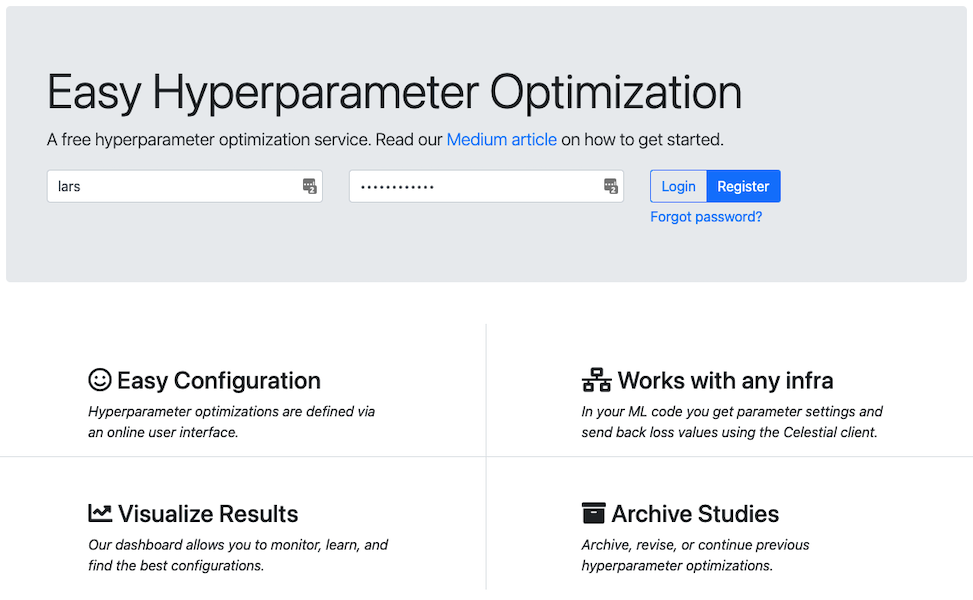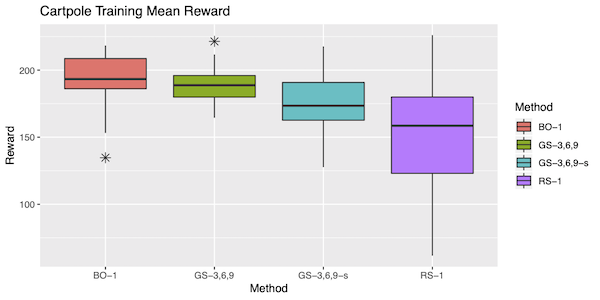Lars Hertel
Machine Learning Engineer
A machine learning engineer with a PhD in Statistics and a track record of identifying and solving complex problems in a variety of domain areas using machine learning and statistics. Combines mathematical understanding with software engineering experience to efficiently identify and achieve objectives.
Featured Projects Work Experience Education ConnectFeatured Projects

Celestial-AutoML: A free hyperparameter optimization service
Celestial (www.celestial-automl.com) is a free web service for hyperparameter optimization of machine learning algorithms. It makes getting started very easy by providing a web user interface for setting up the optimization and tracking results. Since Celestial is just an API to get parameter configurations and send back loss values, you can easily scale up. On top of that, the web UI gives you the power to visualize your results and go back to older studies to review and learn from them.
View Blog Post
Reproducible Hyperparameter Optimization
Published in Journal of Computational and Graphical StatisticsA key issue in current machine learning research is the lack of reproducibility. We illustrate what role hyperparameter search plays in this problem and how regular hyperparameter search methods can lead to a large variance in outcomes due to non-deterministic model training during hyperparameter optimization. The variation in outcomes poses a problem both for reproducibility of the hyperparameter search itself and comparisons of different methods each optimized using hyperparameter search. In addition, the fact that hyperparameter search may result in non-optimal hyperparameter settings may affect other studies since hyperparameter settings are often copied from previously published research. To remedy this issue we define the mean prediction error across model training runs as the objective for the hyperparameter search. We then propose a hypothesis testing procedure that makes inference on the mean performance of each hyperparameter setting and results in an equivalence class of hyperparameter settings that are not distinguishable in performance. We further embed this procedure into a group sequential testing framework to increase efficiency in terms of the average number of model training replicates required. Empirical results on machine learning benchmarks show that at equal computation the proposed method reduces the variation in hyperparameter search outcomes by up to 90 percent while resulting in equal or lower mean prediction errors when compared to standard random search and Bayesian optimization. Moreover, the sequential testing framework successfully reduces computation while preserving performance of the method.
View Publication
Sherpa: Hyperparameter Optimization for Machine Learning Models
Published in SoftwareXSherpa is a hyperparameter optimization library for machine learning models. It is specifically designed for problems with computationally expensive, iterative function evaluations, such as the hyperparameter tuning of deep neural networks. With Sherpa, scientists can quickly optimize hyperparameters using a variety of powerful and interchangeable algorithms. Sherpa can be run on either a single machine or in parallel on a cluster. Finally, an interactive dashboard enables users to view the progress of models as they are trained, cancel trials, and explore which hyperparameter combinations are working best. Sherpa empowers machine learning practitioners by automating the more tedious aspects of model tuning.



Improved Energy Reconstruction in NOvA with Regression Convolutional Neural Networks
Published in Physical Review DIn neutrino experiments, neutrino energy reconstruction is crucial because neutrino oscillations and differential cross-sections are functions of neutrino energy. It is also challenging due to the complexity in the detector response and kinematics of final state particles. We propose a regression Convolutional Neural Network (CNN) based method to reconstruct electron neutrino energy and electron energy in the NOvA neutrino experiment. We demonstrate that with raw detector pixel inputs, a regression CNN can reconstruct event energy even with complicated final states involving lepton and hadrons. Compared with kinematics-based energy reconstruction, this method achieves a significantly better energy resolution. The reconstructed to true energy ratio shows comparable or less dependence on true energy, hadronic energy fractions, and interaction modes. The regression CNN also shows smaller systematic uncertainties from the simulation of neutrino interactions. The proposed energy estimator provides improvements of 16% and 12% in RMS for νe CC and electron, respectively. This method can also be extended to solve other regression problems in HEP, taking over kinematics-based reconstruction tasks.
View PublicationWork Experience
Machine Learning Engineer
December 2019-Present
Part of the Feed AI team which is responsible for personalizing the LinkedIn feed using statistics, machine learning, and natural language processing. The goal of our team is to help our members stay connected to their professional world, stay informed and establish their personal brands.
Data Science Intern
Obsidian Security
June-September 2018
Developed behavior analytics algorithm using deep learning. After exploratory data analysis and feedback from team members, I recognized the need to model user behavior as a key business objective. I was eventually joined by another intern in building a scalable code-base in Spark, SageMaker, and Keras and illustrating the research in a completed manuscript.
Machine Learning Intern
Apple
June-September 2017
Created hyperparameter optimization feature for internal machine learning platform. Handled complex interaction with underlying platform while drawing on team’s experience to come up with an elegant software design and user interface. Finished with a fully functioning and tested feature by the end of the internship.
Computer Vision Intern
Honda Research Institute USA
July-September 2015
Developed pedestrian detector using convolutional networks. Implemented preprocessing and fine-tuned state-of-the-art object detectors on proprietary and public pedestrian datasets, achieving competitive performance when compared to custom built pedestrian detectors.
Education
University of California, Irvine, CA, USA
Doctorate, Statistics
Advised by Professor Pierre Baldi and Professor Daniel Gillen. GPA: 3.876.
Imperial College, London, UK
Masters of Science, Statistics
Masters thesis on Brain MRI segmentation with deep learning.
Queen Mary, University of London, UK
Bachelor of Science, Physics
Final thesis on financial time series analysis.